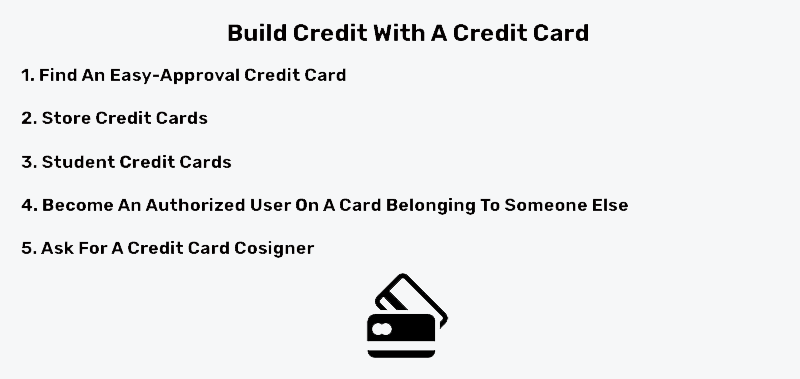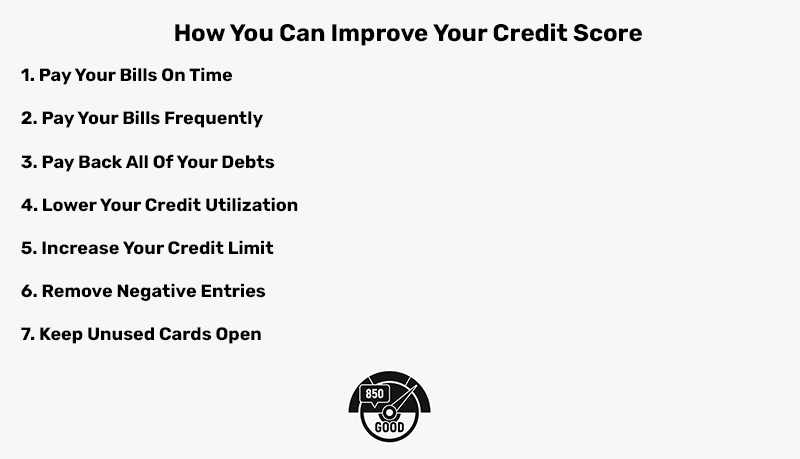For most people, credit is an essential part of life if they intend to make big purchases such as houses or new cars. It may also appear that the credit industry is working against you rather than for you. Fortunately, credit reporting agencies incentivize the development of good spending and lending habits for those just starting to build credit.
By understanding credit and how credit reporting agencies work, you can develop sound spending habits. Whether you are starting from scratch or need to improve your score, the information in this guide can lead you towards your goal.
Build credit with a credit card
Currently, 1 in 11, or 11% of adults are credit-invisible. In other words, 26 million Americans don't have access to credit. These are people who would have difficulty applying for most loans, leases, and credit cards. However, not having a credit score does not prevent you from establishing credit.
The first step in building credit is to establish a credit lending history. If you are starting without a credit or lending history, there are several ways to build credit. While they don't offer much in terms of perks, they provide an opportunity to build credit.
-
Find an easy-approval credit card
A secured credit card is a way of establishing a credit history without any associated risks that come with borrowing money. A secured credit card requires a cash deposit that is collateral for a line of credit. Most secured credit cards require a $200 deposit at a minimum and may add an annual fee, depending on the lender.
If you take this approach, you must pay off any outstanding balances when they are due because they come with a high purchase annual percentage rate for any amount overdue. You should use a secured credit card as you would a debit card, only to make purchases you can afford to make.
-
Store credit cards
Store credit cards are an option that select businesses offer to finance in-store and general purchases. Store credit cards often come with a low or no credit score requirement, making them an excellent option for someone just starting out building a credit history.
-
Student credit cards
Student credit cards are an option for college-level students over the age of 18. They may require a minimum credit score to be considered, but the requirements are designed with students' needs in mind. With low annual percentage rates and competitive reward programs, they are a great way to build credit if just getting started.
-
Become an authorized user on a card belonging to someone else
Credit card companies may allow the card owner to have multiple authorized users on the account. An authorized user is not accountable for paying fees or debt but can make changes to the card. As an authorized user, you will begin to show on the credit history of the card, starting to build credit. Since an authorized user is not fully accountable to repay the debts, you are better off asking a parent or guardian if they will list you as an authorized user. Be advised that becoming an authorized user will give you standing as with the credit bureau, but you may not build sufficient history to aggregate a credit score.
-
Ask for a credit card cosigner.
A cosigner can help when applying for a credit card if you don't have sufficient funds, are under the age of 21, or don't have a credit history of your own. The cosigner will be the responsible party vouching that if any funds are due, they are accountable for paying the debt.
Some people are skittish about being a cosigner because of the responsibility that they assume. For that reason, ask your parent or guardian if they are comfortable being a credit card cosigner.
How to build credit without having a credit card
While credit cards may be the most common way to build credit, they come with more responsibility and higher interest rates. Fortunately, there are other ways to build credit without using a credit card.
-
Negotiate a loan
Any loan applies to your credit score. As a result, if you plan on a large purchase or expense, you can negotiate a loan. If you are seeking credit without a credit history, the lender may ask for collateral or get a cosigner. Cosigners are typical for a first car and student loans since they are typically for a significant amount. Student loans may have a payback period of over ten years and will begin to build credit when you start making your first payments. Car loans have a shorter payback period and are reflected in your credit score quicker.
-
Take a credit builder loan.
Credit builder loans are designed with new lenders in mind. Credit unions, banks, and self-lending companies offer small loans of around $1,000 to establish credit. When a loan is taken out, you are expected to pay it back over 6 to 12 months. To receive a positive credit score, you will need to make payments on time.
How you can improve your credit score
Now that you have established a credit history, improving your credit can be a bit more complicated. Your credit score is calculated using your lending statistics, payment history, transactions, types of credit, and total amounts owed. With budgeting best practices and careful planning, you can establish an upwards trend.
The best ways to improve your credit score include:
-
Pay your bills on time
Keeping up to date on your credit card payments has the most impact on improving your credit score over time. Your payment history is the top-most weighted metric in your FICO score and weighs heavily into your credit. If you struggle to make full payments, minimum payments will not hurt your credit score.
-
Pay your bills frequently
Paying off your credit cards more frequently can have a positive effect on your credit score because it will keep your credit utilization low and help you stay ahead of large debts. More frequent payments also provide a higher number of payments for your credit score to be calculated from. Paying your bills more frequently is a long-term investment and will positively affect your credit score in months instead of weeks.
-
Pay back all your debts
Paying back outstanding debts can have a positive and negative impact on your credit score. Paying off debt earlier or later than expected may negatively affect your credit score. Credit companies encourage.
-
Lower your credit utilization
Your credit utilization is the percent of funds borrowed compared to your total credit limit. Your average credit utilization is a significant factor in your credit score, signaling your spending on the cards is close to your limit. Ideally, your credit utilization score is 30 percent or below. Keeping your credit utilization low as hitting your limit will negatively impact your credit score.
-
Increase your credit limit
If you find yourself nearing your credit limit between each payment, ask your card provider to increase your limit. When you reach out to increase your limit, be sure you don't have a balance or a bill due on the card. The credit card company will look into your account before making a decision. They can deny your request if you have any outstanding balances, frequently miss payments, or often pay only the minimum balance.
-
Remove negative entries
Negative entries like late payment charges, hard inquiries, reporting mistakes, and even delinquencies may be removed from your credit. Removing a negative credit entry is one of the quickest ways to improve your credit score. Take advantage of the 30 days between the adverse credit event and when the credit reporting agencies are updated to fix the issue.
-
Keep unused credit cards open
Closing unused and old credit cards is less than ideal and could negatively impact your credit by shortening your lending history and raising your credit utilization. However, for those cards with fees or minimum usage requirements, you should close them despite the impact to your credit report.
Repair your credit quickly
Negative credit report entries consist of late payments, delinquencies, charge-offs, overdrafts, and many other negative lending practices. Another approach to raising your credit score is through credit restoration services that remove negative entries from your credit history.


